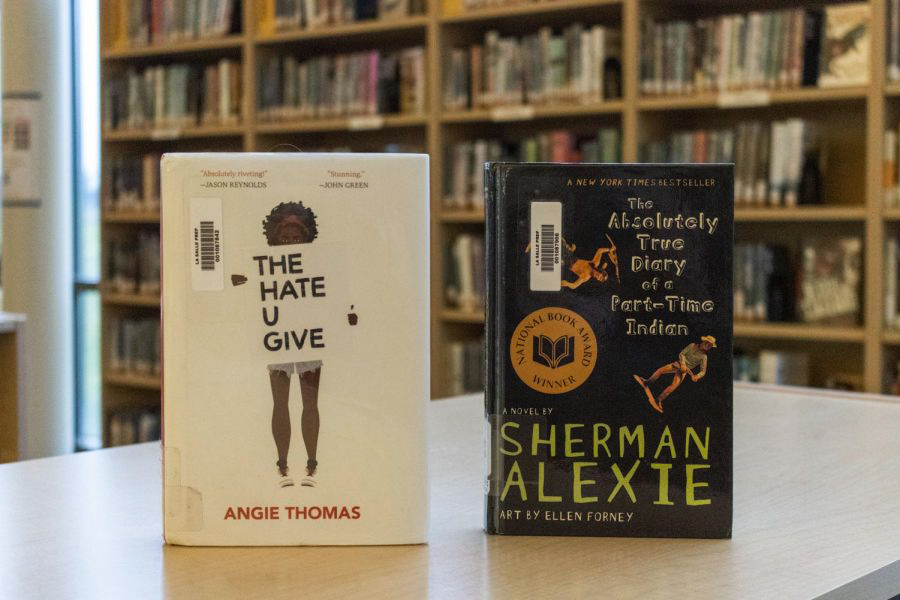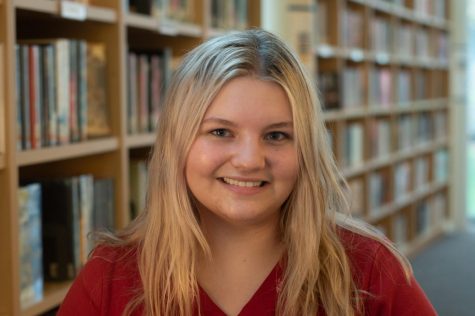Four Banned Books That Provide Important Life Perspectives
Banning books stops readers from learning about the different topics that many experience in real life.
January 8, 2020
Sparking conversations, breaking stigmas, and exploring complex topics are all things “banned books” consistently do.
Books that have been banned share one thing in common — they have offended someone somewhere. The majority of banned books are prohibited due to political, religious, legal, or moral motives.
If a book is banned, there is typically something inside the text that is concerning or offensive. Someone in power requests that it be censored, and if it’s approved, the book is considered banned.
When books are banned, depending on the circumstances, it means they are not allowed to be present in schools or libraries or wherever else someone in power decided they should not be — it doesn’t mean that you couldn’t buy them from Amazon or a local bookstore.
Books being too violent, sexual, having morally questionable behavior, racially insensitive terms or topics, and cursing are other reasons that books have been banned in certain communities.
In 1982, the American Library Association launched the first banned books week, to celebrate the freedom of reading. Since then, educators, publishers, libraries, and bookstores use the week assigned by the ALA to spark conversations surrounding the negative impacts of censorship.
From reading these four banned books, I have gained more knowledge and awareness surrounding topics such as sexual assault, racism, alcoholism, and suicide, and I hope you can too. Ultimately, I loved reading these books, and recommend them without reservation. Fortunately, all four of these books are available in the La Salle library.
The Absolutely True Diary of A Part-time Indian – Sherman Alexie
This novel showcases the reality of a 14 year-old boy living on the Spokane Indian Reservation, and the struggles that come with it. Junior, the main character, struggles in his high poverty school, having to transfer to an all white private school, off the reservation. Junior tells the stories of the horrible alcohol ridden reservations, racist mascot reality, and his journey through his sexuality.
The coming of age novel has been challenged due to some seeing it as being “anti-Christian,” having “excerpts of masturbation,” and being racist and vulgar. Some have even claimed the book “encourages pornography.” While these ideas may be offensive to many, the reality is that they are things happening in the real world that shouldn’t have to face censorship.
In 2016, a teacher in Wisconsin “was challenged by several parents in the school district.” The teacher told American Experience about why she wanted to teach the novel in her class. “For me, it’s a book that deals with resiliency, the power of education, and the power of community,” English teacher Lynn Frick said. “It’s one of the things that I have always believed in: that education is the way out of your circumstance. That’s beautifully illustrated in True Diary, and I wanted that message out there loud and clear.”
After the novel had become well-known around the school, it was exchanged from person to person, and teachers were snatching it off the shelves. Everyone wanted to read the challenged novel. In the end, “the book was very well received by my students,” Frick said.
Speak – Laurie Halse Anderson
Speak tells the story of Melinda, a girl who seems as if she’s an average teen. She struggles to find her identity, deal with family, and adapt to a new school. After an incident at a summer party, she loses all her friends and finds herself holding onto a huge secret. She was raped.
Due to the sexual content and the challenges that followed, the ALA placed Speak on the Top 100 most challenged or banned books between the years of 2000 to 2009. In 2010, a professor at Missouri State University claimed the novel was “filthy” and lacked morality, as well as exhibiting “soft pornography” due to the discussion of rape.
Calling the discussion of rape as “soft pornography” might discourage others and prevent them from speaking about their experiences. If rape is seen as “filthy,” it’s possible that it can encourage shame and embarrassment surrounding assault.
Despite it being a sensitive subject, sexual assault is very common in America. According to Rainn.org, 1 in 6 American women are victims of attempted or completed rape, and females 16-19 are 4 times more likely than the general population to be victims of rape, attempted rape, or sexual assault.
Banning books promotes keeping experiences inside, unspoken, and contained. This could invoke feelings of shame, portraying rape as pornographic, immoral, filthy, and something that we shouldn’t talk about it.
The Hate U Give – Angie Thomas
Raving reviews, winning awards, and sitting atop the New York Times bestseller’s list for 50 weeks is the novel, The Hate U Give. Written by Angie Thomas in early 2017, The Hate U Give has sparked conversations and shown the reality of police brutality and racism.
Inspired by the Black Lives Matter movement, the main character Starr navigates between a poverty ridden neighborhood filled with gang violence and her predominantly white, elite suburban prep school. When one of her close friends is killed, after encountering a white police officer, her entire world shifts.
The novel was criticized by parents because it included what they believed were inappropriate depictions of drug use, profanity, and offensive language.
The Hate U Give was once banned by school officials in Katy, Texas, and challenged for “inappropriate language.” District Superintendent Lance Hindt pulled the book, claiming he did so based off its “pervasive vulgarity and racially-insensitive language.”
With the help from a movement created by teens in the district, they helped to change the fate of the book. Ny’Shira Lundy gathered enough signatures on a petition calling for the restoration of the book. The district relented and put it on shelves again; however, it wasn’t a total victory. Students are now required to get parental permission in order to read it.
“I’m saddened to hear that a school district in Texas banned #TheHateUGive, but I’m also empowered – you’re basically telling the kids of the Garden Heights of the world that their stories shouldn’t be told,” said author Angie Thomas in a Twitter post. “Well, I’m going to tell them even louder. Thanks for igniting the fire.”
13 Reasons Why – Jay Asher
Before it became a well-known, controversial, Netflix Original series, “13 Reasons Why,” the novel that the show was adapted from, won a California Book Award Silver Medal (2008) and a South Carolina Book Award (2010). In 2017, when the show debuted, concerns quickly emerged among multiple school districts around the country that were trying to ban the novel.
Following a number of suicides in Colorado, the curriculum director of the Mesa County School District pulled the novel from circulation. It was later returned to circulation after protests from librarians, who fought against censorship.
Down south, an elementary school in Florida banned students from possessing the book on campus. They argued students were not mature enough to understand the concept of suicide, profanity, sexual content, and drug use.
“When you hear stories like that on a daily basis and then hear adults call for your work to be banned, it’s proof of why the stigma around these issues is so dangerous,” author Jay Asher said during an interview with PBS. “Challenging ‘Thirteen Reasons Why’ was not a badge of honor, but a reason, I think, why teens have so much trouble opening up to adults. If we say issues of teen suicide, drinking, sex, or sexual assault are inappropriate, we’re telling teens who may identify with those themes that there isn’t a safe space for them.”
Though some may protest a book that a book should be censored due to specific language, the actual result of banning these books closes off conversation and stops readers from learning about the different topics that many experience in real life.






Kelly Tidrick • Jan 9, 2020 at 10:45 am
I loved Ms Avery Eldon’s article, Four banned Books That Provide Important Life Perspectives. Continuing to highlight the unconstitutional act of banning books is vital in maintaining and drawing attention to our First Amendment Rights. It’s hard to believe that in the 21st century the attempt to limit students access to these books through banning in school libraries and curriculum still happens. There is no moving forward, no progress, without a well informed society, with diverse views and experiences. Books like these and others offer that.
Thank you Ms Eldon!
Sincerely,
Kelly Tidrick
Class of 2021 Parent